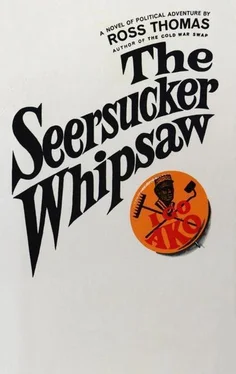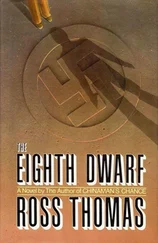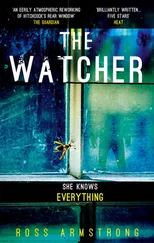Ross Thomas
The Seersucker Whipsaw
Confound their politics,
Frustrate their knavish tricks...
— Old Song
whip · saw (hwip’so) v.t. 1. to cut with a whipsaw; hence, 2. to defeat or get the best of (a person) two ways at once, as in faro, by winning two different bets in a single play.
Webster’s New World Dictionary of the American Language
My four-city search for Clinton Shartelle ended in Denver where I found him playing shortstop for the Kwikway Truckers in a sandlot park at 29th and Champa. He was playing barefoot and talking it up in the infield.
The scoreboard said it was the top half of the ninth and that the Truckers were leading the Pueblo Ironmen six to five. There was one out with the tying run on first. The bleachers that ran along the third and first base lines were about three-quarters filled with the teams’ families, friends, and just people who think a free baseball game is a good way to kill a warm July evening.
I took a seat in the stands next to a fat Mexican who ate tamales out of a newspaper as he gave some advice to the pitcher.
“Burn it in there, baby!” the Mexican yelled through a cupped hand. He had something wrong with his adenoids and whatever it was lent his voice a blasting resonance that crackled in the night air.
“Where do you get the tamales?” I asked.
“Guy’s got a cart, right down there by third,” the Mexican said. I went over and bought three tamales from an old man with a white pushcart that rolled on bicycle wheels. He used The Denver Post to wrap them in, but the individual tamales were bound in real cornshucks. They cost twenty-five cents each.
I went back to the bleachers and sat down by the Mexican again. The pitcher tried another fast ball, but it was low and outside. “How come the guy playing short hasn’t got any uniform?” I asked the Mexican.
“Just a minute,” he said and gave the pitcher some additional encouragement. “The guy out there was just sitting here watching. Then when Connors got his ankle twisted, he just goes over and talks to the manager and they give him Connors’ glove and he starts playing. He ain’t bad neither.”
“Connors is regular short, huh?”
“He’s regular short, but he got his ankle twisted in the second inning when he mistook a hop.”
“And the tall guy’s been playing since?”
The Mexican chewed the last of his tamale, licked his fingers neatly, and nodded. “That’s right,” he said after he tidied himself up.
The pitcher took a long windup and tried a slider. It was hit-and-run. The man at the plate got a fat piece of the ball as the runner on first scampered towards second. It was a hard-hit grounder to short that took a nasty bounce, but Shartelle pulled it in on the hop and snapped it to second in one smooth motion as if he had been doing it all spring and summer. The second baseman made a nice throw to first in time for the double play.
“How ’bout that?” the Mexican said.
“He can go to his right,” I said.
“Not bad for an old guy like that.”
“You mean the shortstop?”
“He must be close to forty.”
“And then some,” I said and walked down from the bleachers towards the bench of the Kwikway Truckers.
I had never met Clinton Shartelle, but I had seen pictures of him in the elaborate dossier that the agency had compiled and bound in a leather folder that made it look like a presentation to Anaconda Copper. We always went sled-length in that agency. The pictures had been mostly news shots, grainy stuff from AP, UPI’s Wide World, Black Star, and the rest of the commercial houses. In nearly all of them Shartelle had been in the background, apparently by accident, standing slightly behind and to the right of the photos’ principal figures. In most of the shots he wore a preoccupied look, as if he were trying to remember whether he had turned off the roast. In others, he was next to a variety of beaming but somehow glassy-eyed men — young, old, and middleaged — who smiled vacuous smiles and made some small gesture of victory: a thumb and index finger forming an O or hands clasped together over their heads in the boxer’s salute.
The pictures showed Shartelle as a man with a face in the shape of a broken heart. His chin came to a rough point and a wide mouth wandered around above it. His nose was on the right track until it got halfway to where it was supposed to go and then it veered slightly to the left. It was a good nose, a strong nose. His eyes in the pictures were dark and direct and the left eyebrow was in a fixed arc that lent him a questioning look. It was a face that gave off, if it gave off anything, an air of preoccupied amusement that stopped just short of cynicism, but not much short.
He was using a towel on the short-cropped hair that was his trademark, when I approached him. The hair met in a widow’s peak, was pure white, and had been so since he was nineteen years old.
“That was a nice play, Mr. Shartelle,” I said.
He turned to look at me. “Now you’d be a little young to scout for the Pittsburgh Pirates,” he said. “Although that was a kindly thing to say to a man of my years.”
“It was a fine catch and a good snap to second. I’m Peter Upshaw.”
He put the towel on the bench and we shook hands. “My pleasure, Mr. Upshaw.”
“I’ve been looking for you for five days. You’ve been moving around.”
“You come on slow, Mr. Upshaw. But nice.”
I smiled. “It’s a holdover from the days when I sold mutual funds in college.”
“And now you’re selling?”
“I’m not. I work for Padraic Duffy. In London.”
“Himself?”
“The same.”
Shartelle nodded and looked up as the ballpark’s lights were switched off. “And how is the poor Irish lad from Chicago who aspires to be England’s noblest lord?” He didn’t seem really interested.
“He was in New York for a month recently. We all hoped that they enjoyed having him there as much as we enjoyed him being there.”
“He hasn’t changed, I take it?”
“No. He hasn’t changed.”
Shartelle gave me an appraising look and again nodded his head slightly. “He hasn’t changed the initials either?”
“No. They still stand for Duffy, Downer and Theims. Limited.”
“Prosperous, I hear.”
“Very.”
“Padraic Francis Duffy — or Pig as we called him.”
“He raises them now, in case you’re interested.”
“He would,” Shartelle said. “He would raise pigs just to prove that a pigsty, as long as it’s Irish, can be a work of art. Chester Whites?”
“Poland Chinas.”
Shartelle produced a package of Picayunes and offered me one.
“I didn’t think they still made these,” I said.
“You can get them at the tobacco stores, the kind of places that sell nothing but tobacco. Most drug stores don’t carry them.”
“They’re strong.”
“I’m getting just a little chilled,” Shartelle said. “Why don’t we go to my hotel and I’ll take a shower and then you can make your pitch.” He looked around the deserted baseball field. “For some reason, I don’t think this is quite the place to entertain a proposition from Pig Duffy.”
Shartelle had a small suite in the old part of the Brown Palace on Sixteenth and Broadway. He had a view of the mountains, furniture that was a cross between Italian Provincial and Midwestern Modern, about two dozen books, and an ample liquor supply. It looked as if he had settled in for a long stay.
“You a married man, Mr. Upshaw?”
“Not any more.”
Читать дальше












